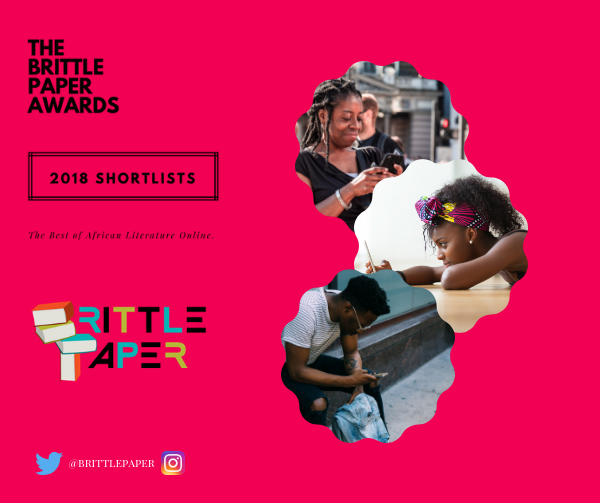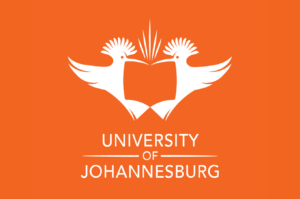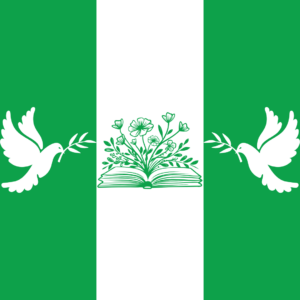
Update: For failure to attribute an original source, the Caine Prize, in September 2019, removed Tochukwu Emmanuel Okafor’s “All Our Lives” from its 2019 shortlist, while Short Story Day Africa released a statement on intertextuality. Because we believe it to have resulted from inexperience rather than intentional withholding, we did not withdraw it from our own shortlist.
We are delighted to announce the shortlists for the 2018 Brittle Paper Awards. Begun in 2017 to mark our seventh anniversary, the Awards aim to recognize the finest, original pieces of writing by Africans published online. The $1,100 cash prize is split across five categories: the Brittle Paper Award for Fiction ($200), the Brittle Paper Award for Poetry ($200), the Brittle Paper Award for Creative Nonfiction ($200), the Brittle Paper Award for Essays & Think Pieces ($200), and the Brittle Paper Anniversary Award ($300) for writing published on our blog.
Forty-eight pieces were shortlisted last year, and the winners: South African memoirist Sisonke Msimang for Essays & Think Pieces, Liberian novelist Hawa Jande Golakai for Creative Nonfiction, Nigerian poet JK Anowe for Poetry, South African writer Megan Ross for Fiction, and Nigerian poet Chibuihe Obi for the Anniversary Award.
For the 2018 Awards, we made a call for nominations, for works published between 31 July 2017 and 31 August 2018 and available for free online—available to be engaged with. In drawing up the lists, we looked at aesthetics, formal innovation, significance, and impact. We paid attention to works that inspired readers to rethink their assumptions about African writing. Some of our picks have been read and shared widely on social media. All have kindled important conversations and debates or have identified and built on areas still under-explored.
In the Essays & Think Pieces category—which, for the first time, includes an interview, that mode of literary conversation often overlooked as a think piece—conversations are had and re-had, books reread, legacies rethought, leaving us pondering race and power and privilege, contemporary poetry, photography. This year’s poetry selections reconsider bodies, families, relationships, and political developments. In the Creative Nonfiction category, the shortlisted works are either honoring history or figures on the boundary of history or turning an inward gaze towards the self. In the Fiction category, lives are hidden, mourned, distrusted, accepted. And in the Anniversary category, ideas war. Together, the 31 nominated pieces reflect the state of contemporary African literary culture.
There is no doubt that we are in the midst of an African literary renaissance. No other generation has written this much poetry, fiction, critiques, and commentaries in the history of African literature. These awards represent our mission here at Brittle Paper to preserve this wealth of literary productivity from getting lost in the chaos of social media and the Internet, so that readers, publishers, writers, and scholars can stay informed about global trends in the African literary scene and so that the significance of these works can transcend the initial moment of their publication.
This is also a celebration not only of writers and their works but also of magazines, journals, and websites, and their editors and publishers who have set up open spaces where true literary diversity can thrive, where their works speak for themselves.
The winners will be announced on Monday, November 19, 2018.
The Brittle Paper Award for Creative Nonfiction ($200)
“On Meeting Toni Morrison,” by Sarah Ladipo Manyika (Nigeria), in Transition
In the calm of her home, one of our leading novelists sits with one of literature’s great storytellers and lets us, in beautiful prose un-sinking under the weight of awareness, into what can only be appreciated as a holy literary communion across generations.
“The Miseducation of Gratitude,” by Sibongile Fisher (South Africa), in Selves: An Afro Anthology of Creative Nonfiction, published online in Enkare Review
This sure-footed, poetic, track-by-track reinterpretation and claiming of Lauryn Hill’s 1998 album is a soulbreaking autobiography of love, motherhood, family, and wounds. It is literary confessionality at its most bare.
“How to Gossip About African Writing in Geneva,” by Oris Aigbokhaevbolo (Nigeria), in Catapult
Opening with a fine paragraph, we are treated, in chatty, chewable prose, to a visit to Geneva, a rumination on cultural quirks, and centrally, a meeting with the novelist Petina Gappah—warm, witty, an object of admiration. We are let into more rumination, of the writer’s beginnings in the business, of bits of writing-career wisdom, of Gappah getting a guitar. An exploration of what it means to meet writers, especially when they are older and don’t want—or, in a cited case, want—to be written about.
“Chapter Thirty-Three,” by Binyavanga Wainaina (Kenya), in Brittle Paper
The last chapter, yet, from his acclaimed memoir, One Day I Will Write About This Place(2011)—the second chapter to arrive after the book—moves across decades, from 1983 to 1972 to 2010 to 1940, and across childhood cultural impressions and adulthood political moments in Kenya, from fascination with music and music instruments to indulgence in masturbation to recounts of Kenyatta and Moi, allowing a read as wholesome as anything. It is the finest prose writer of his generation in one of his several modes.
“A House for Mr Soyinka,” by Kola Tubosun (Nigeria), in Popula
A visit to Wole Soyinka’s refreshing, art-filled house deep in the Abeokuta forest leads to a revealing portrait of a cultural great on the boundary between—to use Teju Cole’s phrasing elsewhere—the contemporary and the historical.
“Home Means Nothing to Me,” by Tinashe Mushakavanhu in collaboration with Nontsikelelo Mutiti and Simba Mafundikwa (Zimbabwe), in Chimurenga
The life and movements of Dambudzo Marechera in Harare, between 1982 and 1987, on his return to Zimbabwe after forced exile in the United Kingdom, are documented in this excitingly innovative mapping project that speaks to the late great writer’s mythology and spirit as well as corrects misconceptions about his work and person.
The Brittle Paper Award for Essays & Think Pieces ($200)
“History Through the Body or Rights of Desire, Rights of Conquest,” by Panashe Chigumadzi (Zimbabwe), in The Johannesburg Review of Books
This mix of literary analysis, history, and memoir uses J.M. Coetzee’s novel Disgrace as a point of both departure and arrival to reckon with race, gender, sex, land, and power in South African literature, politics, and everyday living. By finding links between geographical significances and Coetzee’s body of work, as well as by connecting the different Davids in works by Coetzee, Zoe Wicomb, and John Buchan, the racialized atmosphere of South Africa is broken up, and with it the dehumanization of the black female body by white males, and the black female’s consequent raw fear of white maleness.
“Verse Africa: The Malleable Poetics of Some Contemporary African Poets,” by Matthew Shenoda (Egypt), in World Literature Today
An engagement with poetry by select women from the continent: from the breadth in the iconic Ama Ata Aidoo and the Helen Yitah-edited collection of her work, After the Ceremonies: New and Selected Poems (2017), to the searching power in the Liberian Patricia Jabbeh Wesley and her When the Wanderers Come Home (2017), to the nuanced humanity in the Eritrean-Puerto Rican-African American Aracelis Girmay and her The Black Maria (2016), and centrally, to younger poets who came through the African Poetry Book Fund (APBF): the vision in the Somali Ladan Osman’s The Kitchen-Dweller’s Testimony (2015), the linguistic force of the Sudanese Safia Elhillo’s The January Children (2017), and the conceptual in Mahtem Shiferraw’s Fuchsia(2016). Mention is made also of Botswana’s TJ Dema, Ethiopia’s Liyou Libsekal, Somalia’s Warsan Shire, Zimbabwe’s Tsitsi Jaji, Kenya’s Ngwatilo Mawiyoo, Morocco’s Yasmin Belkhyr, Ghana’s Victoria Adukwei Bulley, and South Africa’s Ashley Makue.
“A Stranger in ‘the Village,’” by Bongani Madondo (South Africa), in The Johannesburg Review of Books
Following the end of its print run, an eloquent reminisce—its title a pun on that of James Baldwin’s 1953 Harper’s essay—of the well-regarded American newspaper The Village Voice and its performatively Brechtian issues. We are taken into a story of culture-propelled intellectualism peaking with the magazine’s coverage of Michael Jackson’s demise. This writer is, in his own words, “a trafficker in word-magic.” And no one writes about magazines and the feel of print like he does, not in such prose of sensual delight as contained in its first section.
“Preserving and Writing History,” Ayesha Harruna Attah (Ghana) in Conversation with Gaamangwe Joy Mogami (Botswana), in Africa in Dialogue
A conversation on Attah’s third novel The Hundred Wells of Salaga (2018) and its engagement of the slave trade in 1890s Ghana, the intergenerational trauma of the present day, and the possibilities of fantasy in historical fiction.
“The Colonizer’s Archive Is a Crooked Finger,” by Emmanuel Iduma (Nigeria), in Catapult
In assuredly paced, transportive prose that offers a calming lesson in style, the life of a 1920s Nigerian schoolteacher is used to enter a world in which photography by colonialists assaulted the Nigerian body, in interpretations that seem to hold their subjects in question. An insight into how photographs name and define their subjects, especially when those people wouldn’t see themselves in said way, and sensitively, the ways in which the body demands and tries to set the terms of engagement.
“James Baldwin in Rhodesia,” by Percy Zvomuya (Zimbabwe), in The Johannesburg Review of Books
Following a thread of intellectual relationships between African Americans and South Africans, an assessment of the influence exerted on James Baldwin by Michael Raeburn’s collection of stories Black Fire! Accounts of the Guerrilla War in Rhodesia (1978)—a book Baldwin blurbed, wrote its introduction, and later reviewed. An analysis of ideas—views on violence, racial tension—reflected in both the book and Baldwin’s work.
The Brittle Paper Award for Poetry ($200)
“A List of Things I Do Not Tell My Mother,” by Sarah Lubala (South Africa & Congo), in Apogee Journal
Brief, controlled contemplations on girlhood, the body, sex, religion, and the ineluctable problem of attraction.
“A Field, any Field,” by Itiola Jones (Nigeria), in The Offing
An alluring tussle with the body and betrayal, and with the irreducible draw of lust, rendered in memorable language strewn with metaphors.
“Origin Myths,” by Megan Ross (South Africa), in The Single Story Foundation Journal
A sum of motherhoods across generations, a meditation on familial bonds and how they shape familiarity, love, loneliness, and private violences.
“On the Isle of Lesbos,” by Tsitsi Jaji (Zimbabwe), in Harvard Review
A haunting reflection on the Syrian refugee crises.
“I Like to Think I’d Yet Manage to Weave Words into Poems,” by Chisom Okafor (Nigeria), in Expound
Vignettes of a child touched by an adult, of something lost and its knowledge fully gained, sprinkled in rhythmic register.
“Summer Night Spent Cosplaying Ashanti & Ja Rule Or Something Else Resembling Happiness,” by Momtaza Mehri (Somalia & UK), in Frontier Poetry
In mostly short lines demonstrating the thrill of indefinite language, a romantic relationship’s downs are splayed.
The Brittle Paper Award for Fiction ($200)
“Moon Secrets,” by Lauri Kubuitsile (Botswana), in The Single Story Foundation Journal
In smooth, competent prose, a middle-aged woman, who experience has taught to be wary of people, guards a life-defining secret that stands between her and the man who loves her.
“The Man at the Bridge,” by Kiprop Kimutai (Kenya), in As You Like It, republished in The Johannesburg Review of Books
A nuanced, memorable portrayal of a man caught between the lure of his male lover and quaking sex, on the one hand, and a marriage wearing him down with a wife trying to keep his interest. A snapshot of culture-fostered gender dynamics.
“Involution,” by Stacy Hardy (South Africa), in Migrations: New Short Fiction from Africa
The female sex organ is an incongruous character in this piece of fabulist fiction. The young woman’s curiosity to know her body part is intriguing and sustained. Innovative.
“Our Husband Grief,” by Christine Odeph (Kenya), in Migrations: New Short Fiction from Africa (as “My Sister’s Husband”), republished in Brittle Paper
A pungent immersion in a breaking family’s tragedy, through the eyes of a deceased daughter in the days up to her burial, that is also an exploration of mourning and changing and changed relationships.
“All Our Lives,” by Tochukwu Emmanuel Okafor (Nigeria), in ID: New Short Fiction from Africa, republished in The Johannesburg Review of Books
An embracing sweep, told in a first-person plural voice, of the lives of young men whose destinies are tied, from their childhoods to their changed, fought-for adulthoods, whose dreams are multiple and their routes to them illegal.
The Brittle Paper Anniversary Award ($300)
“An African in London and Other Reflections on African Literatures,” by Richard Oduor Oduku (Kenya), Memoir
A journey from Nairobi to London, shadowed by the Kenyan elections; an account of SOAS’ commemorative conference to mark 55 years since Makerere. An important reflection on contemporary engagement of literary history and cultural production.
“Why I No Longer Use the Term ‘Game’ for Bushmeat,” by Chika Unigwe (Nigeria), Think Piece, first posted on Facebook
Originally a Facebook post, a thought-provoking reflection on the power in names and its use to suppress. It uses the distinction between the standard English term for wild-caught meat, “game,” and the Nigerian term, “bushmeat,” to expose the dark underbelly of linguistic practices that we tend to take for granted.
“Bantu’s Swahili, or How to Steal a Language from Africa,” by Kamau Muiga (Kenya), Essay
A historiographical rebuttal of claims that Swahili language has its roots outside Africa. An informative, even entertaining, read.
“The Nervous Conditions of the Mother Tongue,” by Mapule Mohulatsi (South Africa), Essay, first published in Selves: An Afro Anthology of Creative Nonfiction
An ethno-lingual survey of her South African upbringing, reflecting remarkably on orality and the seminal power and inseparability of writing and the tongue.
“On Postcolonial Theory,” by Shailja Patel (Kenya), Tweets
The harnessing of social media as a tool for intellectual intervention and engagement can offer as much competence as traditional media: as in these fourteen tweets, by one of our most potent Twitterati, in reiteration of the irreducible relevance of the postcolonial theory. At over 60K views, it is our third most-viewed post in 2018 so far, and the most-viewed of the year.
“Facebook Writers and Other Trivia,” by Alaaka Tobi (Nigeria), Essay
A case for Facebook Writing—key for a generation seeking expression, discriminated against due to both aesthetics and professional politics—as an emergent subgenre of Nigerian literature.
“Jambula Tree,” by Lillian Aujo (Uganda), Poetry
A brief, staying sketch of how women conform to patriarchy, become performers in and for it.
“For What Are Butterflies without Their Wings,” by Troy Onyango (Kenya), Fiction
A chilling tale of familial loss, sibling rivalry, and the efficacy of lies set on the shores of Lake Victoria.
Congratulations to the nominated writers:
Dr. Ainehi Edoro Glines, Editor,
Otosirieze, Deputy Editor.









Three Personal Essays in the Selves Anthology Have Been Shortlisted for The 2018 Brittle Paper Awards - Afroanthology Series April 13, 2019 14:21
[…] to announce that three personal essays in the Selves Anthology have been shortlisted for the 2018 Brittle Paper Awards. The Brittle Paper award recognizes the finest, original pieces of writing by Africans published […]